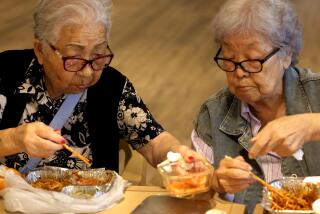Nisei Week Mixes Hope, Celebration : Culture: Little Tokyo is looking to the traditional event to revive area’s business.
- Share via
With business in Little Tokyo down by more than 30% since the Los Angeles riots, community leader Katsumi Kunitsugu is hoping that this year’s Nisei Week festival will be more than just the traditional celebration of Japanese culture.
If Kunitsugu and other organizers have their way, the more than 40,000 people expected to attend the festival, which begins tonight, will keep coming back after the beat of the taiko drums and graceful movements of Kabuki buyo dancers are long gone.
Little Tokyo is one of the oldest Japanese-American communities in the continental United States, founded 107 years ago when a former seaman from Japan opened a restaurant on Los Angeles Street. Yet most Southern Californians know little about it.
“You don’t have to go to Japan to experience Japan,” said Kunitsugu, executive secretary of the Japanese American Cultural and Community Center. “We have a lot to offer right here in Little Tokyo, but (until now) we haven’t really made the effort to reach out and connect” with the broader community, she said.
Japanese community and business leaders hope that the festival, which ends Aug. 15, will attract more visitors to the venerable downtown village, the cultural, religious and social center for more than 200,000 people of Japanese ancestry in Southern California.
This is not the first time festival organizers have tried to use the event as a vehicle to help businesses in Little Tokyo. “Nisei Week was originated in 1934 after the Great Depression to revitalize Little Tokyo’s economy,” said James Okazaki, chairman of the 1993 Nisei Week.
Except for five years during and immediately after World War II--when Japanese-Americans were rounded up and interned in camps--Nisei Week has been held annually.
As in the past, this year’s festival opens with a coronation ball tonight at the Westin Bonaventure hotel. The ball has become a major Japanese-American community social event. Sunday’s events begin with a Samurai 5-K run in Little Tokyo at 8 a.m. and continue with the grand parade, which is scheduled to begin at 4 p.m. at 2nd Street and Central Avenue.
A special feature of the parade this year are three mikoshi --portable shrines--brought from Japan for the occasion.
During the week, a wide range of activities are scheduled, from flower and bonsai arrangement demonstrations to brush painting, calligraphy and ceramics exhibitions, tea ceremonies, cooking classes, Japanese dance performances, sports events, carnivals and martial arts shows. Admissions to most events will be free. The closing ceremony at 5 p.m. Aug. 15 will feature traditional ondo dancing.
In recent years, Little Tokyo’s proximity to downtown has made the job of promoting the festival difficult. Although violent crime is still relatively rare in Little Tokyo itself, automobile burglaries and aggressive panhandlers have discouraged visitors.
“People hate to come downtown because they’re afraid of crime,” said Joyce Chin, general manager of Nisei Week. “They get turned off when they get pestered by panhandlers.”
“All it takes is one bad experience and people don’t come back,” said Satoru Uyeda, a Little Tokyo businessman and chairman of the Mayor’s Little Tokyo Development Advisory Committee.
Hiromichi Kume, president of the Little Tokyo Business Assn., said his group is concentrating on making the area safer, cleaner and friendlier to try to reverse the downturn in business there.
Earlier this year, Irene Y. Hirano, president of the Japanese American National Museum, convened the Little Tokyo Focus Group in an effort to promote the community as a major tourist attraction. The 40-member panel, representing about 300 establishments in the area, has been working on a program to rekindle interest in Little Tokyo.
Little Tokyo business people mobilized to tackle the problem after a transient entered a 1st Street restaurant, pushed a patron aside and ate his food.
The result was the formation of the Little Tokyo Anti-Crime Assn., which has 100 members. Volunteers, carrying flashlights and walkie-talkies, patrol the Japanese village in small teams from 6 p.m. to midnight twice a week to keep panhandlers from bothering visitors. Their goal is to increase the patrol to every evening. The program is paying off, members said.
“Most people we confront and ask to move don’t give us any trouble,” said Brian Kito, owner of Fugetsu-do confectionary on 1st Street.
During the festival, hundreds of college students and private security guards will bolster the security efforts of Los Angeles police officers assigned to the area.
“We hope people of all ethnicities will come to Little Tokyo and enjoy themselves and have a taste of Japanese culture and foods,” Chin said.
More to Read
Sign up for Essential California
The most important California stories and recommendations in your inbox every morning.
You may occasionally receive promotional content from the Los Angeles Times.













